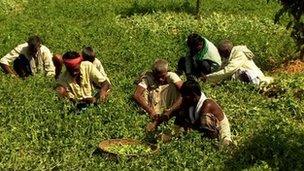New focus for British aid to India
- Published

British aid has funded a call centre to help people access state services
Britain's big aid programme in India is under scrutiny as never before. Critics say that India should be able to fund its own development, since it has nuclear weapons and a space programme.
The focus of Britain's large aid programme to India is changing so that within two years, half of it will go into private sector investment.
Britain is the largest bilateral donor, giving $454m (£280m) a year. This is nine times as large as US aid to India.
The programme has come under increased scrutiny - including from the Commons international development committee, who said that the aid should be "fundamentally changed".
There were fresh attacks last month when it emerged that International Development Secretary Andrew Mitchell had appeared to link possible arms sales to the aid programme.
In the event India chose to negotiate with France, not Britain, for a major contract to supply fighter jets.
The aid is now focused on three of the poorest states - Bihar, Orissa and Madhya Pradesh. In areas like this it is hard for the private sector to secure investment as returns are low and risks high.
'Stopped dreaming'
Britain wants to put investment into companies that have a social impact, to grow the economy from the bottom. I visited a vegetable production company which is applying for funds.
The owner of the company, Kaushalendra, said that nothing had happened in Bihar for 30 years: "People had lost the courage to do anything for themselves, and had stopped dreaming."
During those years corrupt government impoverished the state so that now, if it were a country, it would be the third poorest in the world with a per capita income of around $400.
Most farmers live at subsistence levels, living below the poverty line of $1.25 a day, even if they sell some crops, and are wholly responsible for the risks of failure.
Kaushalendra guarantees to buy their vegetables, sharing the risk, and employs packagers and vendors to sell the food on special stalls he has set up.
All the way along the line, I saw lives transformed by the experience.
Farmers, packers and vendors all said that they could now send their children to school - which they could not do before.
In the evening, on a stall on a busy road junction in Patna, Mina Devi told me that she used to have to go to the wholesale market at 5am to buy vegetables, helped by her children.
Now that the packaging and distribution is done for her "my children are not involved in the business. They can go to school, and I have a guaranteed income".
Bad practices
This has obvious consequences for development - increasing the flow of cash, and the number of people who are educated.
The other main change in the way UK aid is being distributed is in building the capacity of the state of Bihar to provide services for its people.

Most farmers earn below the global poverty line of $1.25 a day
This has the somewhat surprising consequence of a call centre being set up using British aid money, where people call to get advice on how to access help from the state.
This kind of aid is opposed by critics in India, who say that the government can do this kind of thing for itself.
A former foreign minister, Shashi Tharoor, said that if Britain wanted to help "perhaps one solution could be for the British government to give its aid directly to charities on the ground who are working directly with poor people".
But supporters of direct British support for government services say that Bihar needs this technical expertise to recover from the bad practices of the past.
Poorest people
Millions more people will be brought out of poverty more quickly than they would have done.
This capacity is even as basic as setting up systems so that Bihar can absorb funds due to it from central government.
Until recently 40% of this money was not even used because the state did not have systems to cope with it.
NK Singh, a former senior government official who has been advising the Bihar administration, said that the British aid "fulfils a very critical and important role which other government programmes don't".
Opposition within the government of India to the continued British aid programme has not gone away. Some continue to feel that the programme "sends the wrong image" of India.
But Britain's justification for continuing the aid programme is that if there is to be a serious commitment to reaching the millennium development goals, then that must include a policy in India - home to one third of the poorest people in the world, and half of the malnourished children.
- Published20 October 2011
- Published1 March 2011
- Published27 February 2011